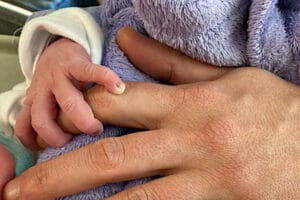Surrogacy is an assisted reproductive technology that allows partially infertile parents (at least one parent must have genetic material) to bring a genetically related child into the world. It is quite a complex and long process. It can help in diagnoses such as severe uterine malformations, frequent spontaneous abortions, hormonal imbalances that cannot be corrected, the complete absence of the uterus or oncological diseases in which pregnancy is prohibited. Technology allows these parents to bring children into the world, without health and life risk.
But unfortunately, there are many myths and misinformation about surrogacy, especially regarding the child’s genetic connection.
Is there a genetic link between the child and the surrogate mother?
Will the child have the surrogate mother’s genes? This question interests many couples planning to participate in the surrogacy procedure. To understand this question, it is important to understand how gene transfer occurs during simple physiological fertilization.
To create a new human life, two sex cells are needed: a sperm and an egg. Each of them carries 50% of the embryo’s genetic code. And when they unite during fertilization, a completely new cell is formed, which contains 50% of the DNA of the mother and 50% of the father. Characteristics are transmitted through these genes, including external differences, character, behavior, and even diseases.
The specific traits depend on the genes present. For example, if the father is prone to obesity, but the mother is not, the child will be more like the one whose genes are more dominant in this area. The child will carry this genetic information from the moment of conception until the end of life and will pass it on to any future children.
Surrogacy is a method that uses the cells of the biological parents (if possible). In this method, the mother’s egg and father’s sperm is collected. Then in the laboratory, fertilization takes place in which an embryo develops over several days and then placed it in the womb of a surrogate mother. The fetus then begins to develop and grow.
Therefore, a surrogate mother only carries and gives birth to the child. Genetic information from a surrogate mother cannot be added to the existing load, as from the moment of fertilization the child already has its own genetic code, which is 50% from the mother, 50% from the father. The surrogate mother can transfer only nutrients to the child.
In case the future parents are unable to provide their own gametes, then a gamete from a donor can be used. They can either use an egg donor and/or a sperm donor, but never the gametes from the surrogate.
The influence of a surrogate mother on a child during pregnancy.
The surrogate mother can influence the child’s development, condition and life. Between the surrogate mother and the baby there is a blood-placental barrier, which protects the baby from harmful substances, infections and other substances floating in the mother’s blood – for example tobacco particles, heavy metals, drugs and chemicals. However, there is no protection against all viruses and bacteria if the surrogate mother carries them and therefore she may infect the fetus that may be born with a disease.
Therefore, it is necessary that the selection of the surrogate mother is carried out in a strict manner. Potential surrogates are fully screened; many tests are carried out and attention is paid to the surrogate mother’s lifestyle. For example, smoking and drinking alcohol are prohibited during pregnancy. That’s why parents who want to participate in a surrogacy procedure should contact only reliable agencies and professionals that take care of the selection and monitoring of the surrogate mother.
Do you need to undergo a DNA test after birth?
This is a question that many parents ask. And in general, it depends on the legislation of the country where the surrogacy process is taking place. In most cases at the end of surrogacy programs, doctors will perform a DNA analysis of the child and the biological parents. This is so that the parents can be sure of the child’s genetics and for legal documents.
Dozens of studies and experiments showed that the child carries the genes of its biologic’s parents. And not a single test in the world showed any genetic resemblance to the surrogate mother. Therefore, do not worry for a moment that the DNA test will not show similarities between you and your baby.
Remember, the child will inherit absolutely everything from the parents, from external features, character and genetic diseases. He can contract disease from the surrogate mother in some cases, such as if she contracted an infectious disease. But with strict monitoring by the fertility clinic, which accompanies the surrogate mother throughout the pregnancy and performs regular and comprehensive diagnoses, you can certainly be quiet and calm. Good luck.
Tammuz Family
We are an international surrogacy, fertility, and egg donation company. For more information, write to info@tammuz.com
This content was created for general educational purposes only and might change with time. Speak to your doctor about any questions you may have regarding a medical condition, as the content here does not replace a care plan as determined by a physician.

























